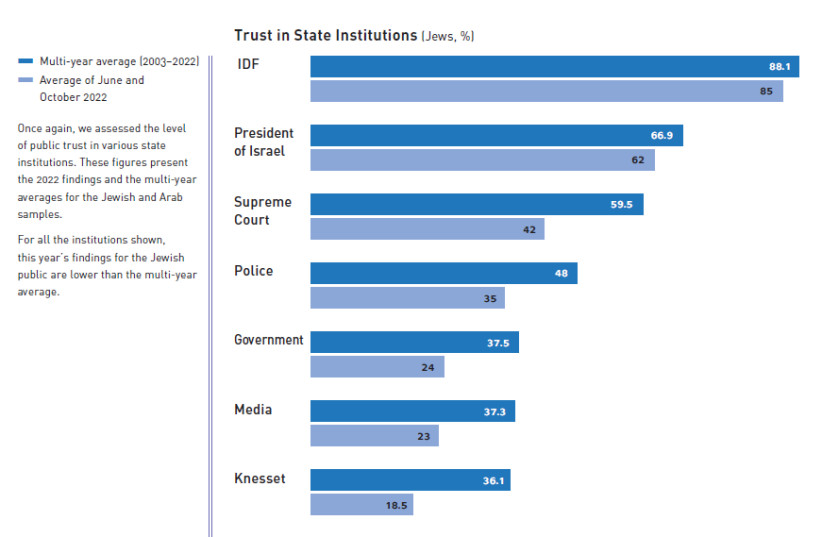We’re used to seeing the results of sporadically published polls showing that, despite the difficulties of living here, Israelis are by and large happy with their lives and their country.
There’s a lot to love about living here, but as the data released in Sunday’s publication of the Israeli Democracy Index for 2022 shows, Israelis are becoming increasingly disgruntled.
According to the report, marking the IDI’s 20th anniversary of releasing the annual index, slightly less than half of Israelis (49%) are optimistic about the future of the country. This represents a drop from 76% when asked the same question 10 years ago.
Although there has been a rise in the public’s confidence in the institutions of the IDF and the presidency, the IDI analysis found that between 2012 and 2022, overall trust in Israeli institutions dropped from a high of 61% on average to an unprecedented average low of just 33%.
This includes the police, the government, the Knesset, political parties and the media.

Public trust in the local media (23%), the Knesset (18%) and political parties (9%) all reported record lows.
The Supreme Court recorded its lowest approval rating since IDI began collecting information, with just 42% of respondents expressing trust in it. That figure marks a considerable dip from the two-decade average of 59.5%.
Broken down according to political affiliation, only 29% who identified as right-wing said they trusted the Supreme Court, compared to 80% of left-wing Israelis and 62% of those in the Center.
“These are unpleasant figures, which come on top of other sections of the report that reflect the internal tensions within us,”
Israeli President Isaac Herzog
It’s especially pertinent to take a closer look at this issue, considering the sweeping judicial reforms the government and its Justice Minister Yariv Levin are attempting to bulldoze through.
Prime Minister Benjamin Netanyahu has repeatedly stated that the majority of the country supports the moves to diminish the authority of the Supreme Court, but the figures released by the IDI report paint a more nuanced picture.
Some 58% of respondents believed the court should have the authority to overturn laws approved in the Knesset “if they are found to be contrary to the principles of democracy.”
That broke down into 37.5% who identified themselves as right-wing, 70% of centrists and 89% who labeled themselves as leftists. More than half of Jews (56%) and almost three-fourths of Arabs (71%) supported such an ability of the court to overturn Knesset laws.
What those results reveal is that the issue of undertaking a judicial revolution, as the Netanyahu government says is its mandate from the election earlier this year, must include extensive debate, discussion and oversight, both from within the government and Knesset and outside them.
Regarding the other national institutions whose level of trust among the public has been eroded, it’s incumbent on them to rehabilitate their image – which means fundamental changes in how they operate.
Lack of trust affect people in different ways
That lack of trust affects people in various ways, including diminishing their sense of belonging and increasing factionalism in society, according to the index results.
President Isaac Herzog related to this when he received the report on Sunday from Yohanan Plesner, president of the IDI, and Prof. Tamar Hermann, director of the institute’s Viterbi Family Center for Public Opinion and Policy Research.
“I am therefore deeply worried about three points in the report presented to me today: the erosion of solidarity in Israel, the weakening of the sense of belonging to the country and the decline in optimism about our condition,” he said.
“These are unpleasant figures, which come on top of other sections of the report that reflect the internal tensions within us,” Herzog said. “In other words, our cohesion is being weakened, and we must do everything to rebuild it.”
It’s an uphill battle that will require focus and attention on so many facets of Israel’s institutions and the fabric of the country. The government’s emphasis on judicial reform will not address most of the pressing issues exposed in the IDI report.
In fact, if anything can be taken away from it, it’s that the issue of judicial reform is not one of them.
